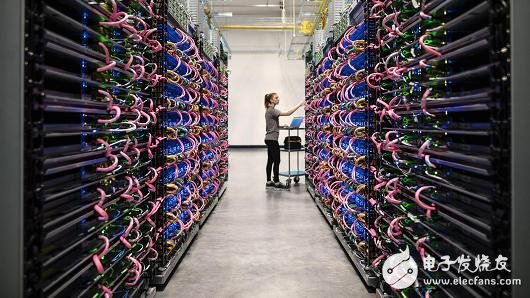Google's machine learning tool Cloud TPU will be fully open to the public for the first time. Jeff Dean, a Google legendary chip engineer, announced the news with ten twitters. Third-party vendors and developers can spend $6.5 an hour to use it, but they need to fill out the form first.
Previously, TPU was used in Google's internal products. With the opening of the Cloud TPU, this means that the AI ​​chip and the public cloud market will usher in a new change.
Google also released a beta version of the Cloud TPU, which is available on the Google Cloud platform to help more machine learning experts run models faster. Cloud TPU is a hardware accelerator designed by Google to optimize and accelerate the learning of specific TensorFlow machine learning workloads.
"Opening up the TPU for personal use as a cloud service shows that Google is investing more in cloud business. Google will compete with all vendors that offer smart cloud services; and chips will compete with Nvidia." Gartner Research Vice President Shenglinghai told the First Financial Reporter.
Despite this, both Google and Nvidia have denied a direct competitive relationship between the two parties. This is because NVIDIA's chips are geared toward a wider range of applications, and Google's artificial intelligence chips are only focused on machine learning. Thanks to the demand for artificial intelligence, NVIDIA's share price has risen more than six times in the past two years.

As early as last May 17th at the Google I/O conference, Google announced the official launch of the second generation of TPU processors focused on artificial intelligence. TPU is a high-performance processor developed by Google independently for artificial intelligence computing services. For example, the first generation of products have been used in data centers and artificial intelligence including AlphaGo.
The second-generation TPU chip released last year not only deepened the ability of artificial intelligence in learning and reasoning, but Google is serious about bringing it to market. According to Google's internal testing, the second-generation chip can save half the time for machine learning training than the current graphics chip (GPU) on the market.
Li Feifei, chief scientist of the Google Cloud Computing team and director of the AI ​​lab at Stanford University, said at the time: "These TPUs offer an amazing 128 trillion floating-point operations, which are chips designed to drive machine learning technology." The iPhone 6 offers 100 trillion floating-point operations, and NVIDIA's Volta GPU provides 120 trillion floating-point operations.
NVIDIA is currently the leader in graphics chip GPUs. Jim McHugh, vice president and general manager of Enterprise Systems at NVIDIA, said: "NVIDIA's NVIDIA GPU Cloud (NGC) is popularizing the advanced neural network of AI's transformative power for the rapidly growing global audience." NGC has already provided services to Amazon's cloud platform.
When Google introduced the second-generation TPU, it launched the Cloud TPU cloud computing service, which users can rent, and the billing will also adopt the same mode as the GPU computing service, which is priced in minutes. At the time, Google said that the latest AI chip will not be sold to companies based on other chip maker servers in the data center, such as Dell.
This also means that Google's development strategy in AI chips is not to compete directly with GPUs, but to use TPU to differentiate in the public cloud industry. Google’s chief technology officer Urs Holzle said: “In essence, TPU is a supercomputer for machine learning. Our goal is to provide the best cloud services.â€
At the same time, Google announced its latest quarterly earnings report in early February, and also announced the revenue of the single-season cloud business for the first time, reaching $1 billion. In contrast, Amazon and Microsoft Cloud have more than $5 billion in single-season revenues. Google is currently ranked third in the global cloud services market.
From the perspective of Nvidia, according to the latest quarterly financial report, NVIDIA data center business is the company's current second largest source of revenue, more than 600 million US dollars, more than doubled year-on-year, an increase of 105%. At the GPU Technology Conference in China last September, Nvidia announced a data center cooperation agreement with China's BAT.
The entry of Google made NVIDIA investors worried. They believe that Google's participation will take away large data center operator customers, which will affect NVIDIA's earnings and revenue. Because even if Google can't commercialize its own chips, it will win the bargaining power.
Digital Signage,Digital Screen Poster,Android Video Players,Digital Signage Display Screen
APIO ELECTRONIC CO.,LTD , https://www.displayapio.com